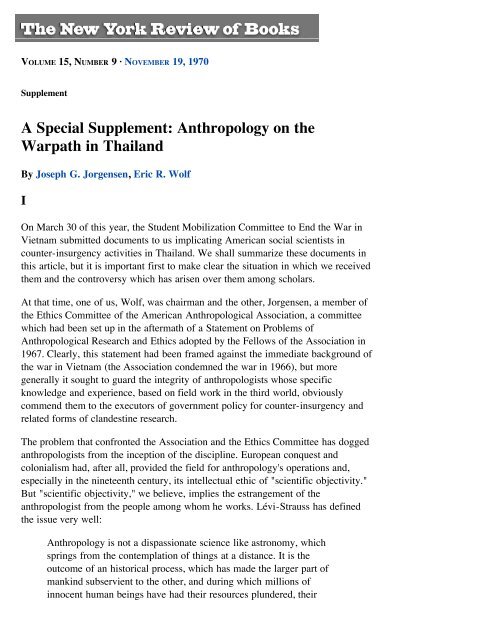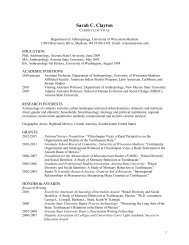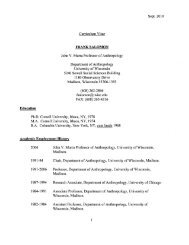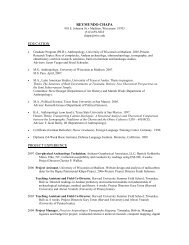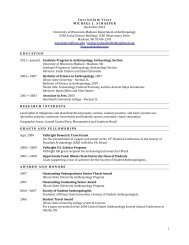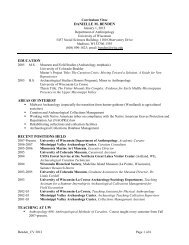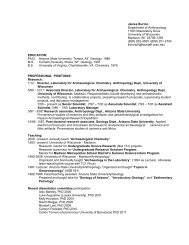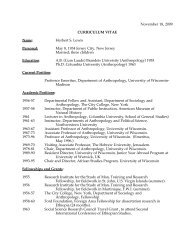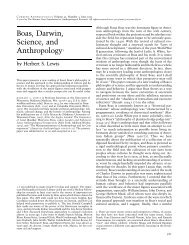Anthropology on the Warpath in Thailand - Department of ...
Anthropology on the Warpath in Thailand - Department of ...
Anthropology on the Warpath in Thailand - Department of ...
Create successful ePaper yourself
Turn your PDF publications into a flip-book with our unique Google optimized e-Paper software.
VOLUME 15, NUMBER 9 · NOVEMBER 19, 1970<br />
Supplement<br />
A Special Supplement: <str<strong>on</strong>g>Anthropology</str<strong>on</strong>g> <strong>on</strong> <strong>the</strong><br />
<strong>Warpath</strong> <strong>in</strong> <strong>Thailand</strong><br />
By Joseph G. Jorgensen, Eric R. Wolf<br />
I<br />
On March 30 <strong>of</strong> this year, <strong>the</strong> Student Mobilizati<strong>on</strong> Committee to End <strong>the</strong> War <strong>in</strong><br />
Vietnam submitted documents to us implicat<strong>in</strong>g American social scientists <strong>in</strong><br />
counter-<strong>in</strong>surgency activities <strong>in</strong> <strong>Thailand</strong>. We shall summarize <strong>the</strong>se documents <strong>in</strong><br />
this article, but it is important first to make clear <strong>the</strong> situati<strong>on</strong> <strong>in</strong> which we received<br />
<strong>the</strong>m and <strong>the</strong> c<strong>on</strong>troversy which has arisen over <strong>the</strong>m am<strong>on</strong>g scholars.<br />
At that time, <strong>on</strong>e <strong>of</strong> us, Wolf, was chairman and <strong>the</strong> o<strong>the</strong>r, Jorgensen, a member <strong>of</strong><br />
<strong>the</strong> Ethics Committee <strong>of</strong> <strong>the</strong> American Anthropological Associati<strong>on</strong>, a committee<br />
which had been set up <strong>in</strong> <strong>the</strong> aftermath <strong>of</strong> a Statement <strong>on</strong> Problems <strong>of</strong><br />
Anthropological Research and Ethics adopted by <strong>the</strong> Fellows <strong>of</strong> <strong>the</strong> Associati<strong>on</strong> <strong>in</strong><br />
1967. Clearly, this statement had been framed aga<strong>in</strong>st <strong>the</strong> immediate background <strong>of</strong><br />
<strong>the</strong> war <strong>in</strong> Vietnam (<strong>the</strong> Associati<strong>on</strong> c<strong>on</strong>demned <strong>the</strong> war <strong>in</strong> 1966), but more<br />
generally it sought to guard <strong>the</strong> <strong>in</strong>tegrity <strong>of</strong> anthropologists whose specific<br />
knowledge and experience, based <strong>on</strong> field work <strong>in</strong> <strong>the</strong> third world, obviously<br />
commend <strong>the</strong>m to <strong>the</strong> executors <strong>of</strong> government policy for counter-<strong>in</strong>surgency and<br />
related forms <strong>of</strong> clandest<strong>in</strong>e research.<br />
The problem that c<strong>on</strong>fr<strong>on</strong>ted <strong>the</strong> Associati<strong>on</strong> and <strong>the</strong> Ethics Committee has dogged<br />
anthropologists from <strong>the</strong> <strong>in</strong>cepti<strong>on</strong> <strong>of</strong> <strong>the</strong> discipl<strong>in</strong>e. European c<strong>on</strong>quest and<br />
col<strong>on</strong>ialism had, after all, provided <strong>the</strong> field for anthropology's operati<strong>on</strong>s and,<br />
especially <strong>in</strong> <strong>the</strong> n<strong>in</strong>eteenth century, its <strong>in</strong>tellectual ethic <strong>of</strong> "scientific objectivity."<br />
But "scientific objectivity," we believe, implies <strong>the</strong> estrangement <strong>of</strong> <strong>the</strong><br />
anthropologist from <strong>the</strong> people am<strong>on</strong>g whom he works. Lévi-Strauss has def<strong>in</strong>ed<br />
<strong>the</strong> issue very well:<br />
<str<strong>on</strong>g>Anthropology</str<strong>on</strong>g> is not a dispassi<strong>on</strong>ate science like astr<strong>on</strong>omy, which<br />
spr<strong>in</strong>gs from <strong>the</strong> c<strong>on</strong>templati<strong>on</strong> <strong>of</strong> th<strong>in</strong>gs at a distance. It is <strong>the</strong><br />
outcome <strong>of</strong> an historical process, which has made <strong>the</strong> larger part <strong>of</strong><br />
mank<strong>in</strong>d subservient to <strong>the</strong> o<strong>the</strong>r, and dur<strong>in</strong>g which milli<strong>on</strong>s <strong>of</strong><br />
<strong>in</strong>nocent human be<strong>in</strong>gs have had <strong>the</strong>ir resources plundered, <strong>the</strong>ir<br />
<strong>in</strong>stituti<strong>on</strong>s and beliefs destroyed while <strong>the</strong>y <strong>the</strong>mselves were
<strong>in</strong>stituti<strong>on</strong>s and beliefs destroyed while <strong>the</strong>y <strong>the</strong>mselves were<br />
ruthlessly killed, thrown <strong>in</strong>to b<strong>on</strong>dage, and c<strong>on</strong>tam<strong>in</strong>ated by diseases<br />
<strong>the</strong>y were unable to resist. <str<strong>on</strong>g>Anthropology</str<strong>on</strong>g> is <strong>the</strong> daughter to this era <strong>of</strong><br />
violence. Its capacity to assess more objectively <strong>the</strong> facts perta<strong>in</strong><strong>in</strong>g to<br />
<strong>the</strong> human c<strong>on</strong>diti<strong>on</strong> reflects, <strong>on</strong> <strong>the</strong> epistemological level, a state <strong>of</strong><br />
affairs <strong>in</strong> which <strong>on</strong>e part <strong>of</strong> mank<strong>in</strong>d treats <strong>the</strong> o<strong>the</strong>r as an object. [1]<br />
On <strong>the</strong> o<strong>the</strong>r hand, anthropology, as Stanley Diam<strong>on</strong>d has po<strong>in</strong>ted out, was<br />
<strong>in</strong>herently "a revoluti<strong>on</strong>ary discipl<strong>in</strong>e," [2] which, <strong>in</strong> <strong>the</strong> traditi<strong>on</strong> <strong>of</strong> M<strong>on</strong>taigne and<br />
Rousseau, radically questi<strong>on</strong>ed <strong>the</strong> pretensi<strong>on</strong>s to superiority <strong>of</strong> Western<br />
civilizati<strong>on</strong>, while seek<strong>in</strong>g alternative visi<strong>on</strong>s <strong>of</strong> man. This latter aspect <strong>of</strong> <strong>the</strong><br />
anthropological c<strong>on</strong>sciousness has always been recognized <strong>in</strong> <strong>the</strong> United States, to<br />
<strong>the</strong> endur<strong>in</strong>g credit <strong>of</strong> such men as Franz Boas, Robert Redfield, and Paul Rad<strong>in</strong>.<br />
Throughout <strong>the</strong> history <strong>of</strong> <strong>the</strong> pr<strong>of</strong>essi<strong>on</strong> anthropologists have c<strong>on</strong>demned <strong>the</strong><br />
assault <strong>of</strong> <strong>the</strong> American government <strong>on</strong> American Indians (although <strong>the</strong> "soluti<strong>on</strong>s"<br />
<strong>the</strong>y suggested were not, and perhaps could not have been, better than those from<br />
any o<strong>the</strong>r source); and <strong>the</strong> Associati<strong>on</strong> has defended <strong>the</strong> social and cultural rights <strong>of</strong><br />
m<strong>in</strong>ority peoples, and taken early and unequivocal positi<strong>on</strong>s aga<strong>in</strong>st fascism and<br />
racism. The Nazis, it should be noted, understood this aspect <strong>of</strong> <strong>the</strong> discipl<strong>in</strong>e <strong>in</strong><br />
Europe and systematically sought to cut <strong>the</strong> heart out <strong>of</strong> German anthropology,<br />
reduc<strong>in</strong>g it to a reflex <strong>of</strong> <strong>the</strong> regime. They were not, <strong>of</strong> course, impressed by any<br />
claim to scientific objectivity.<br />
Most recently, anthropologists have been <strong>in</strong> <strong>the</strong> forefr<strong>on</strong>t <strong>of</strong> <strong>the</strong> protest aga<strong>in</strong>st<br />
<strong>the</strong> war <strong>in</strong> Vietnam. The c<strong>on</strong>cept <strong>of</strong> <strong>the</strong> teach-<strong>in</strong> was <strong>in</strong> fact <strong>in</strong>vented by an<br />
anthropologist, Marshall Sahl<strong>in</strong>s <strong>of</strong> Michigan; Eric Wolf was a founder <strong>of</strong> <strong>the</strong><br />
movement, and anthropologists c<strong>on</strong>tributed disproporti<strong>on</strong>ately to <strong>the</strong> organizati<strong>on</strong><br />
<strong>of</strong> <strong>the</strong> first teach-<strong>in</strong>s <strong>on</strong> campuses throughout <strong>the</strong> country. Therefore, although we<br />
did not solicit <strong>the</strong> <strong>in</strong>formati<strong>on</strong> that was handed to us by <strong>the</strong> Student Mobilizati<strong>on</strong><br />
Committee, it was understandable that <strong>the</strong>y should have c<strong>on</strong>tacted us.<br />
Immediately afterward, <strong>the</strong> SMC held a press c<strong>on</strong>ference <strong>in</strong> Wash<strong>in</strong>gt<strong>on</strong> which was<br />
covered by The New York Times <strong>in</strong> a c<strong>on</strong>fus<strong>in</strong>g report. Never<strong>the</strong>less, some<br />
anthropologists had now been alerted to <strong>the</strong> issue. On April 2, excerpts from <strong>the</strong><br />
documents were published <strong>in</strong> a special issue <strong>of</strong> <strong>the</strong> Student Mobilizer, an SMC<br />
publicati<strong>on</strong> which was devoted exclusively to <strong>the</strong> exposure <strong>of</strong> counter-<strong>in</strong>surgency<br />
research <strong>in</strong> <strong>Thailand</strong>. Copies <strong>of</strong> <strong>the</strong> Mobilizer were subsequently distributed at <strong>the</strong><br />
annual meet<strong>in</strong>g <strong>of</strong> <strong>the</strong> Associati<strong>on</strong> <strong>of</strong> Asian Studies <strong>in</strong> San Francisco: names were<br />
given, reputati<strong>on</strong>s were questi<strong>on</strong>ed, tempers flared, and, <strong>on</strong>ce aga<strong>in</strong>, <strong>the</strong> <strong>in</strong>tegrity <strong>of</strong><br />
social scientists was challenged. [3]<br />
Independently, and without any knowledge <strong>of</strong> <strong>the</strong> steps planned by SMC, Wolf, as<br />
chairman <strong>of</strong> <strong>the</strong> Ethics Committee, privately wrote to each <strong>of</strong> four anthropologists<br />
whose names were most prom<strong>in</strong>ently and repeatedly menti<strong>on</strong>ed <strong>in</strong> <strong>the</strong> documents,<br />
ask<strong>in</strong>g <strong>the</strong>m for clarificati<strong>on</strong> and assur<strong>in</strong>g <strong>the</strong>m that <strong>the</strong> "announced purpose <strong>of</strong> <strong>the</strong>
ask<strong>in</strong>g <strong>the</strong>m for clarificati<strong>on</strong> and assur<strong>in</strong>g <strong>the</strong>m that <strong>the</strong> "announced purpose <strong>of</strong> <strong>the</strong><br />
Ethics Committee [is] to deal with cases <strong>on</strong> as an<strong>on</strong>ymous a basis as possible, <strong>in</strong> an<br />
effort to develop an approach—without penaliz<strong>in</strong>g any <strong>in</strong>dividuals." With <strong>the</strong>se<br />
letters we enclosed <strong>the</strong> follow<strong>in</strong>g statement:<br />
S<strong>in</strong>ce <strong>the</strong>se documents c<strong>on</strong>tradict <strong>in</strong> spirit and <strong>in</strong> letter <strong>the</strong> resoluti<strong>on</strong>s<br />
<strong>of</strong> <strong>the</strong> American Anthropological Associati<strong>on</strong> c<strong>on</strong>cern<strong>in</strong>g clandest<strong>in</strong>e<br />
and secret research, we feel that <strong>the</strong>y raise <strong>the</strong> most serious issues for<br />
<strong>the</strong> scientific <strong>in</strong>tegrity <strong>of</strong> our pr<strong>of</strong>essi<strong>on</strong>. We shall, <strong>the</strong>refore, call <strong>the</strong><br />
attenti<strong>on</strong> <strong>of</strong> <strong>the</strong> American Anthropological Associati<strong>on</strong> to <strong>the</strong>se most<br />
serious matters.<br />
Predictably, our request for clarificati<strong>on</strong> provoked a storm <strong>of</strong> protest—not from<br />
all, but from those who felt <strong>the</strong>mselves maligned by <strong>the</strong> disclosures. Therefore, <strong>on</strong><br />
May 2, at our regularly scheduled meet<strong>in</strong>g <strong>in</strong> Chicago, <strong>the</strong> Ethics Committee<br />
speak<strong>in</strong>g as a group announced formally that:<br />
Our exam<strong>in</strong>ati<strong>on</strong> <strong>of</strong> <strong>the</strong> documents available to us perta<strong>in</strong><strong>in</strong>g to<br />
c<strong>on</strong>sultati<strong>on</strong>, research and related activities <strong>in</strong> <strong>Thailand</strong> c<strong>on</strong>v<strong>in</strong>ces us<br />
that anthropologists are be<strong>in</strong>g used <strong>in</strong> large programs <strong>of</strong> counter<strong>in</strong>surgency<br />
whose effects should be <strong>of</strong> grave c<strong>on</strong>cern to <strong>the</strong><br />
Associati<strong>on</strong>. These programs comprise efforts at <strong>the</strong> manipulati<strong>on</strong> <strong>of</strong><br />
people <strong>on</strong> a giant scale and <strong>in</strong>tertw<strong>in</strong>e straightforward anthropological<br />
research with overt and covert counter-<strong>in</strong>surgency activities <strong>in</strong> such a<br />
way as to threaten <strong>the</strong> future <strong>of</strong> anthropological research <strong>in</strong> South-East<br />
Asia and o<strong>the</strong>r parts <strong>of</strong> <strong>the</strong> world.<br />
This statement was part <strong>of</strong> a communicati<strong>on</strong> addressed by <strong>the</strong> Ethics Committee to<br />
<strong>the</strong> president, <strong>the</strong> president-elect, and members <strong>of</strong> <strong>the</strong> executive board <strong>of</strong> <strong>the</strong><br />
Anthropological Associati<strong>on</strong>. Shortly <strong>the</strong>reafter, <strong>in</strong> resp<strong>on</strong>se to our <strong>in</strong>itiative, <strong>the</strong><br />
executive board reprimanded both <strong>of</strong> us for acti<strong>on</strong>s bey<strong>on</strong>d <strong>the</strong> charge <strong>of</strong> <strong>the</strong><br />
committee, and <strong>in</strong>structed <strong>the</strong> committee to limit itself "to recommendati<strong>on</strong>s <strong>on</strong> its<br />
future role and functi<strong>on</strong>s." We rejected what seemed to us a bureaucratic<br />
<strong>in</strong>terpretati<strong>on</strong> <strong>of</strong> <strong>the</strong> role <strong>of</strong> <strong>the</strong> committee, an <strong>in</strong>terpretati<strong>on</strong> which would have <strong>the</strong><br />
effect <strong>of</strong> keep<strong>in</strong>g pr<strong>of</strong>essi<strong>on</strong>al peace at <strong>the</strong> expense <strong>of</strong> substantive issues, and, <strong>in</strong> a<br />
detailed statement published <strong>in</strong> <strong>the</strong> Associati<strong>on</strong>'s newsletter this past September, we<br />
resigned from <strong>the</strong> committee.<br />
II<br />
The documents we had received were not classified <strong>in</strong> <strong>the</strong> legal sense, but <strong>the</strong>y<br />
were copied from <strong>the</strong> pers<strong>on</strong>al files <strong>of</strong> an anthropologist at a university <strong>in</strong><br />
California. That is to say, we were presented with Xerox copies <strong>of</strong> <strong>the</strong> orig<strong>in</strong>als.<br />
We regret this acti<strong>on</strong>, and would certa<strong>in</strong>ly hot have taken it ourselves, nor would<br />
we have encouraged any<strong>on</strong>e else to do so. But <strong>the</strong> documents seemed to us <strong>of</strong> such
we have encouraged any<strong>on</strong>e else to do so. But <strong>the</strong> documents seemed to us <strong>of</strong> such<br />
significance that, while tak<strong>in</strong>g care to protect <strong>the</strong> names <strong>of</strong> those menti<strong>on</strong>ed, we<br />
n<strong>on</strong>e <strong>the</strong> less felt compelled to pursue <strong>the</strong> questi<strong>on</strong>s raised by <strong>the</strong>m because <strong>of</strong> our<br />
c<strong>on</strong>cern for <strong>the</strong> <strong>in</strong>tegrity <strong>of</strong> our pr<strong>of</strong>essi<strong>on</strong>.<br />
The documents c<strong>on</strong>sist <strong>of</strong> <strong>the</strong> follow<strong>in</strong>g:<br />
1) M<strong>in</strong>utes <strong>of</strong> <strong>the</strong> Jas<strong>on</strong> Summer Study, Institute for Defense Analysis, Falmouth<br />
Intermediate School, Falmouth, Massachusetts, June 20-July 6, 1967;<br />
2) A proposal to <strong>the</strong> Advanced Research Projects Agency, Pittsburgh,<br />
Pennsylvania, entitled "Counter-Insurgency <strong>in</strong> <strong>Thailand</strong>: The Impact <strong>of</strong> Ec<strong>on</strong>omic,<br />
Social and Political Acti<strong>on</strong> Programs," American Institutes for Research,<br />
December, 1967;<br />
3) Trip Report for a visit to Amphoe N<strong>on</strong>g Han, Changwad Ud<strong>on</strong>, May 28-June 6,<br />
1969;<br />
4) Agenda for an Advisory Panel, American Institutes for Research meet<strong>in</strong>g, June<br />
30-July 4, 1969;<br />
5) Amendment to a C<strong>on</strong>tract between <strong>the</strong> United States <strong>of</strong> America, represented by<br />
<strong>the</strong> Agency for Internati<strong>on</strong>al Development, and <strong>the</strong> Regents <strong>of</strong> <strong>the</strong> University <strong>of</strong><br />
California, to facilitate advice and assistance <strong>on</strong> <strong>the</strong> part <strong>of</strong> <strong>the</strong> academic<br />
community for <strong>the</strong> Academic Advisory Council for <strong>Thailand</strong>, September 1, 1968;<br />
6) M<strong>in</strong>utes <strong>of</strong> <strong>the</strong> Academic Advisory Council for <strong>Thailand</strong>, October 19, 1968-July<br />
24, 1969.<br />
The meet<strong>in</strong>gs at which <strong>the</strong>se documents were formulated or presented were not<br />
technically classified as "secret," but were private meet<strong>in</strong>gs <strong>of</strong> which <strong>the</strong> pr<strong>of</strong>essi<strong>on</strong><br />
at large was unaware. The proceed<strong>in</strong>gs were sufficiently suggestive to cause <strong>the</strong><br />
participants to worry about a repetiti<strong>on</strong> <strong>of</strong> <strong>the</strong> notorious Project Camelot [4] which<br />
had not <strong>on</strong>ly sullied <strong>the</strong> reputati<strong>on</strong> <strong>of</strong> North American social scientists <strong>in</strong> Lat<strong>in</strong><br />
America but also had grave political repercussi<strong>on</strong>s <strong>in</strong> itself.<br />
The data <strong>the</strong>mselves give a curious and chill<strong>in</strong>g perspective <strong>on</strong> <strong>the</strong> uses <strong>of</strong> social<br />
science. Take, for <strong>in</strong>stance, <strong>the</strong> first set <strong>of</strong> papers, which describe meet<strong>in</strong>gs <strong>of</strong> a<br />
<strong>Thailand</strong> Study Group made up <strong>of</strong> government <strong>of</strong>ficials, physical scientists, and<br />
members <strong>of</strong> what <strong>the</strong> m<strong>in</strong>utes call <strong>the</strong> "SS Community," <strong>the</strong> community <strong>of</strong> social<br />
scientists. The meet<strong>in</strong>gs were organized at Falmouth, Massachusetts, <strong>in</strong> <strong>the</strong> summer<br />
<strong>of</strong> 1967, by <strong>the</strong> Institute for Defense Analysis, and designated a "Jas<strong>on</strong> Summer<br />
Study." The IDA was organized <strong>in</strong> 1955 to coord<strong>in</strong>ate warrelated work <strong>on</strong> <strong>the</strong><br />
nati<strong>on</strong>'s campuses; its special Jas<strong>on</strong> Divisi<strong>on</strong> was set up to <strong>in</strong>volve academics <strong>in</strong> <strong>the</strong><br />
soluti<strong>on</strong> <strong>of</strong> military problems. The purpose <strong>of</strong> <strong>the</strong> Falmouth meet<strong>in</strong>gs was<br />
specifically to explore <strong>the</strong> usefulness <strong>of</strong> creat<strong>in</strong>g an "SS" Jas<strong>on</strong>, complement<strong>in</strong>g <strong>the</strong>
specifically to explore <strong>the</strong> usefulness <strong>of</strong> creat<strong>in</strong>g an "SS" Jas<strong>on</strong>, complement<strong>in</strong>g <strong>the</strong><br />
already exist<strong>in</strong>g Jas<strong>on</strong> studies carried <strong>on</strong> by physical scientists.<br />
The m<strong>in</strong>utes reveal a surpris<strong>in</strong>g ambiguity <strong>of</strong> motive: Is <strong>the</strong> government<br />
solicit<strong>in</strong>g social scientists, or is <strong>the</strong> SS community solicit<strong>in</strong>g government? They<br />
raise no doubt, however, about <strong>the</strong> hardheaded approach to knowledge taken by <strong>the</strong><br />
government <strong>of</strong>ficials present. When <strong>on</strong>e <strong>of</strong> <strong>the</strong>m is asked if he desires from <strong>the</strong> SS<br />
community "dialogue and <strong>in</strong>dices," he replies bluntly: "I want tools." [5] He wants<br />
hardware, he is not <strong>in</strong>terested <strong>in</strong> discussi<strong>on</strong>. Repeatedly, participants are dismayed<br />
that most social scientists do not want to work for <strong>the</strong> government. Their feel<strong>in</strong>g is<br />
due, some argue, to <strong>the</strong> "priority" <strong>of</strong> "ethical" values, i.e., loyalty to <strong>the</strong> pr<strong>of</strong>essi<strong>on</strong><br />
or to <strong>the</strong> country or to a job. [6] O<strong>the</strong>rs blame <strong>the</strong> Vietnam war, <strong>the</strong> unfortunate<br />
experiences with Camelot, <strong>the</strong> difficulty <strong>of</strong> squar<strong>in</strong>g classified research with <strong>the</strong><br />
"university's missi<strong>on</strong>." [7]<br />
But, as <strong>the</strong> m<strong>in</strong>utes <strong>of</strong> <strong>the</strong> c<strong>on</strong>ference make clear, <strong>the</strong>re are devices for gett<strong>in</strong>g<br />
around <strong>the</strong>se difficulties: <strong>in</strong>creased salaries, c<strong>on</strong>genial compani<strong>on</strong>ship, "<strong>in</strong>terest<strong>in</strong>g<br />
problems like existence <strong>of</strong> Thai communists"; pr<strong>of</strong>essi<strong>on</strong>al opportunities and<br />
prestige; support <strong>of</strong> military <strong>of</strong>ficials at universities; closer ties <strong>of</strong> government with<br />
universities; greater support for RAND and Army th<strong>in</strong>k tanks; <strong>the</strong> hir<strong>in</strong>g <strong>of</strong> top<br />
pr<strong>of</strong>essi<strong>on</strong>als at high costs to enlist and serve as a model for o<strong>the</strong>rs; <strong>the</strong><br />
development <strong>of</strong> adm<strong>in</strong>istrative anthropologists who, <strong>on</strong> <strong>the</strong> British and French<br />
design, would become advisers to Empire. [8] In <strong>the</strong> assistance social science can<br />
give to counter-<strong>in</strong>surgency, anthropology can be particularly useful. "Given <strong>the</strong><br />
apparent importance <strong>of</strong> local factors to <strong>the</strong> recruitment <strong>of</strong> <strong>the</strong> Nor<strong>the</strong>astern<br />
[<strong>Thailand</strong>] <strong>in</strong>surgents, it is important to learn <strong>the</strong> detailed c<strong>on</strong>tent and credibility <strong>of</strong><br />
communist recruitment, tra<strong>in</strong><strong>in</strong>g, and propaganda messages." [9]<br />
Yet usable ideas are scant. There is some crude talk <strong>of</strong> reward<strong>in</strong>g "cool" areas and<br />
depriv<strong>in</strong>g "hot" areas <strong>of</strong> <strong>the</strong> benefits <strong>of</strong> development; <strong>of</strong> us<strong>in</strong>g m<strong>on</strong>ks to "push<br />
social change"; [10] <strong>of</strong> support<strong>in</strong>g democratizati<strong>on</strong> <strong>in</strong> order to "get <strong>the</strong> villagers to<br />
share <strong>in</strong> <strong>the</strong> resp<strong>on</strong>sibility for <strong>the</strong> failure <strong>of</strong> some programs." [11]<br />
Brief attempts at a more sophisticated account <strong>of</strong> regi<strong>on</strong>al and ethnic differences <strong>in</strong><br />
<strong>Thailand</strong> alternate with simplistic clichés about reward and punishment as means<br />
for <strong>in</strong>hibit<strong>in</strong>g aggressi<strong>on</strong>. One anthropologist notes: "I would want to work <strong>on</strong> some<br />
problems if I could get an unclassified paper out <strong>of</strong> it." [12] Ano<strong>the</strong>r reaches <strong>the</strong><br />
comfort<strong>in</strong>g c<strong>on</strong>clusi<strong>on</strong> that "<strong>the</strong>re is little dist<strong>in</strong>cti<strong>on</strong> between basic and applied<br />
research." [13] Apparently <strong>the</strong> credibility <strong>of</strong> <strong>the</strong> SS community rema<strong>in</strong>ed low, for <strong>the</strong><br />
government found <strong>the</strong> services displayed <strong>in</strong>adequate and refused to buy, at least<br />
this time round.<br />
The proposals <strong>in</strong> <strong>the</strong> sec<strong>on</strong>d set <strong>of</strong> documents seem more sophisticated and
proved more c<strong>on</strong>v<strong>in</strong>c<strong>in</strong>g. The ma<strong>in</strong> proposal submitted by <strong>the</strong> American Institutes<br />
for Research <strong>of</strong> Pittsburgh, Pennsylvania, <strong>in</strong> December, 1967, to <strong>the</strong> Advanced<br />
Research Projects Agency (ARPA) <strong>of</strong> <strong>the</strong> <strong>Department</strong> <strong>of</strong> Defense was entitled<br />
"Counter-Insurgency <strong>in</strong> <strong>Thailand</strong>: The Impact <strong>of</strong> Ec<strong>on</strong>omic, Social and Political<br />
Acti<strong>on</strong> Programs." American Institutes for Research (AIR) has a ra<strong>the</strong>r mixed<br />
ancestry: The Special Operati<strong>on</strong>s Research Office (SORO) at American University<br />
<strong>in</strong> Wash<strong>in</strong>gt<strong>on</strong>, which managed <strong>the</strong> Camelot disaster <strong>in</strong> Lat<strong>in</strong> America, was<br />
<strong>the</strong>reup<strong>on</strong> supplanted by CRESS (American University's Center for Research <strong>in</strong> <strong>the</strong><br />
Social Sciences), and, subsequently, AIR. The project itself asked for—and got—<br />
more than a milli<strong>on</strong> dollars for a study which seems as horrify<strong>in</strong>g as it is banal. It<br />
states:<br />
One <strong>of</strong> <strong>the</strong> key problems <strong>in</strong> design<strong>in</strong>g preventive counter-<strong>in</strong>surgency<br />
measures has been that we do not know which k<strong>in</strong>ds <strong>of</strong> ec<strong>on</strong>omic,<br />
social, and political acti<strong>on</strong> are <strong>the</strong> most effective <strong>in</strong> build<strong>in</strong>g nati<strong>on</strong>al<br />
unity and <strong>in</strong> reduc<strong>in</strong>g vulnerability to <strong>in</strong>surgent appeal. [14]<br />
It <strong>the</strong>n proposes not <strong>on</strong>ly to close <strong>the</strong> gap between our obvious capacity to wage<br />
c<strong>on</strong>venti<strong>on</strong>al warfare and our actual mediocre performance <strong>in</strong> counter-<strong>in</strong>surgency,<br />
but also to <strong>in</strong>crease our ability to deal with "<strong>the</strong> social science aspects" so that it<br />
matches <strong>the</strong> level <strong>of</strong> our technology. To accomplish this<br />
…techniques for obta<strong>in</strong><strong>in</strong>g mean<strong>in</strong>gful feedback <strong>on</strong> social impact are<br />
clearly essential. And, s<strong>in</strong>ce it has been <strong>the</strong> same methodological<br />
problem that has most hampered social acti<strong>on</strong> programs <strong>in</strong> <strong>the</strong> United<br />
States, <strong>the</strong> potential sp<strong>in</strong><strong>of</strong>fs <strong>of</strong> <strong>the</strong> proposed project are also<br />
excit<strong>in</strong>g. [15] [italics added]<br />
To develop "techniques for obta<strong>in</strong><strong>in</strong>g mean<strong>in</strong>gful feedback <strong>on</strong> social impact," <strong>the</strong><br />
project promises to make comparis<strong>on</strong>s between communities where <strong>in</strong>surgent<br />
pressures are countered by "acti<strong>on</strong> programs" and communities hit by <strong>in</strong>surgency<br />
but which lack such programs. The proposal is presented <strong>in</strong> a baroque display <strong>of</strong><br />
"<strong>in</strong>puts," "feedback," "ultimate criteri<strong>on</strong> measures," "evaluati<strong>on</strong>s <strong>of</strong> <strong>in</strong>cidental<br />
effects."<br />
(The results that may be expected when proposals such as this <strong>on</strong>e are put <strong>in</strong>to<br />
effect are suggested by a report <strong>of</strong> AIR pers<strong>on</strong>nel after a trip to Amphoe N<strong>on</strong>g<br />
Han, Changwad Ud<strong>on</strong>, May 28-June 6, 1969, which is <strong>in</strong>cluded <strong>in</strong> <strong>the</strong><br />
documents. [16] From this we learn that: "Villages differ. If <strong>the</strong> village ra<strong>the</strong>r than<br />
<strong>the</strong> villager is <strong>the</strong> primary unit for analysis (as had always seemed probable) <strong>the</strong>re<br />
will be variance.")<br />
As it c<strong>on</strong>t<strong>in</strong>ues, <strong>the</strong> 1967 proposal for research <strong>on</strong> counter-<strong>in</strong>surgency grows<br />
more om<strong>in</strong>ously banal:
Moreover,<br />
…<strong>the</strong> effect <strong>of</strong> a given stimulus element <strong>on</strong> a given <strong>in</strong>dividual at a<br />
given moment <strong>in</strong> time is shaped by <strong>the</strong> experiences <strong>of</strong> that <strong>in</strong>dividual <strong>in</strong><br />
resp<strong>on</strong>d<strong>in</strong>g to that stimulus <strong>in</strong> <strong>the</strong> past. [17]<br />
…c<strong>on</strong>diti<strong>on</strong>s that change established stimulus-resp<strong>on</strong>se patterns—<br />
ei<strong>the</strong>r by chang<strong>in</strong>g <strong>the</strong> <strong>in</strong>dividual's history <strong>of</strong> experiences with that<br />
stimulus element or by chang<strong>in</strong>g <strong>the</strong> c<strong>on</strong>temporaneous circumstances<br />
<strong>on</strong> which <strong>the</strong> effectiveness <strong>of</strong> that stimulus element depends…we shall<br />
call dispos<strong>in</strong>g c<strong>on</strong>diti<strong>on</strong>s. [18]<br />
For example,<br />
The <strong>of</strong>fer <strong>of</strong> food <strong>in</strong> exchange for certa<strong>in</strong> services affords a c<strong>on</strong>venient<br />
example. If this has <strong>in</strong> <strong>the</strong> past been a str<strong>on</strong>g stimulus, it can probably<br />
be weakened by <strong>in</strong>creas<strong>in</strong>g local agricultural producti<strong>on</strong>. If it has been<br />
a weak or neutral stimulus, it can probably be streng<strong>the</strong>ned by burn<strong>in</strong>g<br />
<strong>the</strong> crops. [19] [italics added]<br />
The proposal br<strong>in</strong>gs its po<strong>in</strong>t home:<br />
The potential applicability <strong>of</strong> <strong>the</strong> f<strong>in</strong>d<strong>in</strong>gs <strong>in</strong> <strong>the</strong> United States will also<br />
receive special attenti<strong>on</strong>. In many <strong>of</strong> our key domestic programs,<br />
especially those directed at disadvantaged sub-cultures, <strong>the</strong><br />
methodological problems are similar to those described <strong>in</strong> this<br />
proposal; and <strong>the</strong> applicati<strong>on</strong> <strong>of</strong> <strong>the</strong> Thai f<strong>in</strong>d<strong>in</strong>gs at home c<strong>on</strong>stitutes a<br />
potentially most significant project c<strong>on</strong>tributi<strong>on</strong>. [20] [italics added]<br />
Are <strong>the</strong>se social scientists serious or are <strong>the</strong>y <strong>on</strong>ly try<strong>in</strong>g to peddle <strong>the</strong>ir wares? To<br />
those who are aware <strong>of</strong> <strong>the</strong> grow<strong>in</strong>g market for social science research <strong>on</strong> <strong>the</strong> poor<br />
<strong>in</strong> this country, it is all too clear that <strong>the</strong>y are serious. Pr<strong>of</strong>essor Mart<strong>in</strong> Nicolaus's<br />
ir<strong>on</strong>ic remarks at <strong>the</strong> American Sociological c<strong>on</strong>venti<strong>on</strong> <strong>in</strong> 1968 seem appropriate<br />
here:<br />
What if <strong>the</strong> mach<strong>in</strong>ery were reversed? What if <strong>the</strong> habits, problems,<br />
secrets and unc<strong>on</strong>scious motivati<strong>on</strong>s <strong>of</strong> <strong>the</strong> wealthy and powerful were<br />
daily scrut<strong>in</strong>ized by a thousand systematic researchers, were hourly<br />
pried <strong>in</strong>to, analyzed and cross referenced, tabulated and published <strong>in</strong> a<br />
hundred <strong>in</strong>expensive mass circulati<strong>on</strong> journals and written so that even<br />
<strong>the</strong> fifteen-year-old high school dropout could understand it and<br />
predict <strong>the</strong> acti<strong>on</strong>s <strong>of</strong> his landlord, manipulate and c<strong>on</strong>trol him?<br />
The third set <strong>of</strong> documents stems from <strong>the</strong> efforts <strong>of</strong> a group called American<br />
Advisory Council for <strong>Thailand</strong> (AACT) to serve under <strong>the</strong> umbrella <strong>of</strong> AID <strong>in</strong> that<br />
country. The purposes <strong>of</strong> AID operati<strong>on</strong>s <strong>in</strong> <strong>Thailand</strong> are not secret, but have not
country. The purposes <strong>of</strong> AID operati<strong>on</strong>s <strong>in</strong> <strong>Thailand</strong> are not secret, but have not<br />
been widely publicized. They were stated <strong>in</strong> open testim<strong>on</strong>y before <strong>the</strong> Senate<br />
Foreign Relati<strong>on</strong>s Committee <strong>on</strong> Government Operati<strong>on</strong>s, Foreign Operati<strong>on</strong>s and<br />
Government Informati<strong>on</strong> Subcommittee, June 16, 1969, by Robert H. Nooter,<br />
act<strong>in</strong>g assistant adm<strong>in</strong>istrator for East Asia, AID. There we learn that our aid "is<br />
c<strong>on</strong>centrated largely <strong>on</strong> assist<strong>in</strong>g Thai counter-<strong>in</strong>surgency programs <strong>of</strong> various<br />
sorts." [21]<br />
And aga<strong>in</strong>,<br />
Except for a modest amount <strong>of</strong> technical assistance projects, most <strong>of</strong><br />
which we are gradually phas<strong>in</strong>g out, our assistance <strong>in</strong> <strong>Thailand</strong> is<br />
c<strong>on</strong>centrated <strong>on</strong> counter-<strong>in</strong>surgency activities, approximately 75<br />
percent <strong>of</strong> our total effort <strong>in</strong> this field. [22]<br />
Our largest s<strong>in</strong>gle project <strong>in</strong> <strong>Thailand</strong> c<strong>on</strong>sists <strong>of</strong> assistance to various<br />
elements <strong>of</strong> <strong>the</strong> Thai Nati<strong>on</strong>al Police <strong>Department</strong>. [23]<br />
This is quite all right with AACT:<br />
The subject local authority <strong>in</strong> <strong>Thailand</strong>, <strong>in</strong>clud<strong>in</strong>g <strong>the</strong> implicati<strong>on</strong>s for<br />
village security, should be first priority. [24]<br />
And aga<strong>in</strong>, top priority is given to<br />
Streng<strong>the</strong>n<strong>in</strong>g civil security at <strong>the</strong> village level: pr<strong>in</strong>cipally through aid<br />
to <strong>the</strong> Thai nati<strong>on</strong>al police department. [25]<br />
O<strong>the</strong>r c<strong>on</strong>cerns, such as studies <strong>of</strong> cultural patterns and land tenure problems <strong>in</strong><br />
Thai society, "<strong>in</strong>clud<strong>in</strong>g land as an <strong>in</strong>centive and land tenure as related to security,"<br />
are c<strong>on</strong>sidered less important. But a more balanced view is expressed by <strong>the</strong><br />
secretary <strong>of</strong> AACT: "The USOM (US Operati<strong>on</strong>s Missi<strong>on</strong>) objective is to <strong>in</strong>crease<br />
ec<strong>on</strong>omic development without upsett<strong>in</strong>g security and vice versa." [26] We would<br />
not have thought that "scientists" who pride <strong>the</strong>mselves <strong>on</strong> <strong>the</strong>ir "value-free"<br />
approach would have accepted such restrictive def<strong>in</strong>iti<strong>on</strong>s <strong>of</strong> <strong>the</strong>ir research task. In<br />
fact <strong>the</strong>y volunteer to do so:<br />
The basic work <strong>of</strong> AACT is to draw toge<strong>the</strong>r…knowledge <strong>in</strong> any given<br />
case that is relevant to a well-def<strong>in</strong>ed, program-related questi<strong>on</strong> or<br />
topic; and present<strong>in</strong>g this knowledge <strong>in</strong> a form useful to USOM<br />
operati<strong>on</strong>s. In this way, AACT's work will be organized to be as much<br />
as possible part <strong>of</strong> <strong>the</strong> operati<strong>on</strong>s <strong>of</strong> USOM. [27]<br />
To facilitate this basic work, AACT signed a c<strong>on</strong>tract committ<strong>in</strong>g <strong>the</strong> University <strong>of</strong><br />
California at Los Angeles to work with <strong>the</strong> Advisory Council. [28]<br />
The reiterated goal <strong>of</strong> AACT's "basic work" is counter-<strong>in</strong>surgency; <strong>the</strong> agency<br />
<strong>in</strong>volved <strong>in</strong> counter<strong>in</strong>g <strong>in</strong>surgency seeks pr<strong>of</strong>essi<strong>on</strong>al advice, and <strong>the</strong> pr<strong>of</strong>essi<strong>on</strong>als<br />
resp<strong>on</strong>d by volunteer<strong>in</strong>g answers to "well-def<strong>in</strong>ed, programrelated questi<strong>on</strong>s." Thus
esp<strong>on</strong>d by volunteer<strong>in</strong>g answers to "well-def<strong>in</strong>ed, programrelated questi<strong>on</strong>s." Thus<br />
counter-<strong>in</strong>surgency rema<strong>in</strong>s not merely a military and political technique for<br />
creat<strong>in</strong>g compliance through coerci<strong>on</strong>; it also turns out to be a technique for<br />
creat<strong>in</strong>g c<strong>on</strong>sensus <strong>in</strong> <strong>the</strong> m<strong>in</strong>ds <strong>of</strong> its practiti<strong>on</strong>ers, <strong>in</strong>clud<strong>in</strong>g <strong>the</strong> academic<br />
volunteer.<br />
But <strong>the</strong> problem extends well bey<strong>on</strong>d <strong>the</strong> voluntary activities <strong>of</strong> scholars. By<br />
<strong>the</strong>ir acti<strong>on</strong>s, <strong>the</strong>y commit not <strong>on</strong>ly <strong>the</strong>mselves but <strong>the</strong> pr<strong>of</strong>essi<strong>on</strong>al activities and<br />
reputati<strong>on</strong>s <strong>of</strong> o<strong>the</strong>rs. "AACT," says <strong>the</strong> act<strong>in</strong>g adm<strong>in</strong>istrator <strong>of</strong> <strong>the</strong> Office <strong>of</strong> <strong>the</strong><br />
Adm<strong>in</strong>istrator, AID, <strong>Department</strong> <strong>of</strong> State, <strong>in</strong> a letter <strong>of</strong> July 8, 1969, to an <strong>in</strong>quir<strong>in</strong>g<br />
senator, J.W. Fulbright, chairman <strong>of</strong> <strong>the</strong> Committee <strong>on</strong> Foreign Relati<strong>on</strong>s,<br />
was established under <strong>the</strong> auspices <strong>of</strong> <strong>the</strong> Sou<strong>the</strong>ast Asia Development<br />
Advisory Group (SEADAG). Shortly after its formati<strong>on</strong>, SEADAG<br />
began to c<strong>on</strong>sider <strong>the</strong> advisability <strong>of</strong> an academic advisory role <strong>in</strong><br />
direct relati<strong>on</strong> to a Sou<strong>the</strong>ast Asian AID Missi<strong>on</strong>…. Therefore, <strong>on</strong> <strong>the</strong><br />
recommendati<strong>on</strong> <strong>of</strong> a SEADAG task force, <strong>the</strong> Academic Advisory<br />
Council for <strong>Thailand</strong> was formed.<br />
But <strong>the</strong> academic advisers so<strong>on</strong> began to c<strong>on</strong>vert <strong>the</strong> parent body, SEADAG, <strong>in</strong>to a<br />
fr<strong>on</strong>t organizati<strong>on</strong> for <strong>the</strong> activities <strong>of</strong> its <strong>of</strong>fspr<strong>in</strong>g, as can be seen <strong>in</strong> <strong>the</strong> m<strong>in</strong>utes <strong>of</strong><br />
an AACT meet<strong>in</strong>g <strong>in</strong> mid-1969:<br />
In regard to SEADAG <strong>the</strong>re was c<strong>on</strong>siderable disc<strong>on</strong>tent expressed<br />
regard<strong>in</strong>g <strong>the</strong> organizati<strong>on</strong>, development, and particularly <strong>the</strong><br />
management <strong>of</strong> <strong>the</strong> SEADAG grant dur<strong>in</strong>g <strong>the</strong> past year. It was agreed<br />
that AACT should seek a more active role <strong>in</strong> <strong>the</strong> grant<strong>in</strong>g <strong>of</strong> funds for<br />
research <strong>in</strong> <strong>Thailand</strong> through SEADAG next year.<br />
As a first step toward this it was agreed that we should seek to have<br />
Pr<strong>of</strong>essor X appo<strong>in</strong>ted a member <strong>of</strong> <strong>the</strong> SEADAG Executive<br />
Committee. In additi<strong>on</strong> to that it was agreed that AACT should seek a<br />
role <strong>in</strong> <strong>the</strong> screen<strong>in</strong>g <strong>of</strong> grants and <strong>the</strong> establishment <strong>of</strong> areas <strong>of</strong> priority<br />
for research to be funded through SEADAG <strong>in</strong> <strong>Thailand</strong>.<br />
In regard to <strong>the</strong> community <strong>of</strong> Thai scholars, it was was agreed that<br />
AACT should aband<strong>on</strong> its pretensi<strong>on</strong>s to be representative <strong>of</strong> that<br />
group. It should accept its role as basically a c<strong>on</strong>sultative body to AID.<br />
Never<strong>the</strong>less, it was agreed that efforts should be made to extend <strong>the</strong><br />
range <strong>of</strong> activities to <strong>in</strong>clude as wide a selecti<strong>on</strong> <strong>of</strong> Thai specialists as<br />
is feasible. [29] [italics added]<br />
Thus <strong>the</strong> associati<strong>on</strong> between scholarship and counter-<strong>in</strong>surgency has wider<br />
ramificati<strong>on</strong>s. It not <strong>on</strong>ly affects <strong>the</strong> orig<strong>in</strong>al sellers <strong>of</strong> academic skills, but also<br />
seeks to implicate <strong>in</strong>nocent colleagues, much as bad m<strong>on</strong>ey drives out good.
Jas<strong>on</strong>, AIR, AACT are not <strong>the</strong> <strong>on</strong>ly organizati<strong>on</strong>s <strong>in</strong>volved <strong>in</strong> l<strong>in</strong>k<strong>in</strong>g <strong>the</strong> "SS<br />
community" to <strong>the</strong> purposes <strong>of</strong> <strong>the</strong> government. Although <strong>the</strong> documents copied by<br />
SMC make no reference to <strong>the</strong>m, anthropologists have known for some time <strong>of</strong> <strong>the</strong><br />
operati<strong>on</strong>s <strong>of</strong> a Tribal Research Center at Chiang Mai, <strong>Thailand</strong>, which underwrites<br />
large c<strong>on</strong>vocati<strong>on</strong>s <strong>of</strong> scholars and o<strong>the</strong>r <strong>in</strong>terested parties, ma<strong>in</strong>ta<strong>in</strong>s a c<strong>on</strong>siderable<br />
staff, has <strong>in</strong>stalled a computer, provides facilities for occasi<strong>on</strong>al users <strong>of</strong> <strong>the</strong>ir<br />
resources, and o<strong>the</strong>r amenities. For example, <strong>in</strong> January, 1970, social scientists<br />
from several countries ga<strong>the</strong>red at Chiang Mai at a "C<strong>on</strong>sultants' Meet<strong>in</strong>g," toge<strong>the</strong>r<br />
with representatives from forty-three organizati<strong>on</strong>s, <strong>in</strong>clud<strong>in</strong>g ARPA, Military<br />
Research Development Center, United States Operati<strong>on</strong>s Missi<strong>on</strong>, South East Asia<br />
Treaty Organizati<strong>on</strong>, <strong>Thailand</strong> Police <strong>Department</strong>, <strong>Thailand</strong> <strong>Department</strong> <strong>of</strong> Central<br />
Intelligence, <strong>Thailand</strong> Nati<strong>on</strong>al Security Council, United States Informati<strong>on</strong><br />
Service, <strong>the</strong> Peace Corps, and eleven Christian missi<strong>on</strong>s.<br />
The Dean <strong>of</strong> <strong>the</strong> Faculty <strong>of</strong> Social Sciences, Lanna Thai Social Science Research<br />
Center, Chiang Mai, described <strong>the</strong> meet<strong>in</strong>g as a first step toward establish<strong>in</strong>g<br />
communicati<strong>on</strong> am<strong>on</strong>g agencies <strong>in</strong>terested <strong>in</strong> <strong>the</strong> "Tribal Data Center." His group,<br />
he said,<br />
…<strong>in</strong>tended to develop systems <strong>of</strong> collect<strong>in</strong>g, cod<strong>in</strong>g, process<strong>in</strong>g,<br />
<strong>in</strong>tegrat<strong>in</strong>g, stor<strong>in</strong>g, updat<strong>in</strong>g, check<strong>in</strong>g, retriev<strong>in</strong>g and publish<strong>in</strong>g data<br />
c<strong>on</strong>cern<strong>in</strong>g tribal people <strong>of</strong> Nor<strong>the</strong>rn <strong>Thailand</strong> and c<strong>on</strong>tiguous areas.<br />
Build<strong>in</strong>g and equipment facilities are to be developed <strong>in</strong>to a reference<br />
center with <strong>in</strong>-house study facilities for use by scholars and c<strong>on</strong>cerned<br />
government and n<strong>on</strong>government agencies and pers<strong>on</strong>nel. It is hoped to<br />
establish regular communicati<strong>on</strong> with those parties who can provide <strong>the</strong><br />
raw data or who will wish to use <strong>the</strong> processed data. [italics added]<br />
Ga<strong>the</strong>r<strong>in</strong>g raw data, "data storage," and "data retrieval" appear to be central to <strong>the</strong><br />
c<strong>on</strong>cerns <strong>of</strong> <strong>the</strong> Tribal Data Center, for <strong>the</strong> form letter to each social scientist—<br />
pers<strong>on</strong>ally addressed—goes <strong>on</strong> to say: [30]<br />
We understand that <strong>in</strong> <strong>the</strong> course <strong>of</strong> your work you may be <strong>in</strong> a<br />
positi<strong>on</strong> ei<strong>the</strong>r to supply us with raw data c<strong>on</strong>cern<strong>in</strong>g tribal<br />
communities, to utilize <strong>the</strong> processed data, or to give us technical<br />
advice as to systems <strong>of</strong> data collecti<strong>on</strong> and process<strong>in</strong>g…. We need such<br />
up-to-date <strong>in</strong>formati<strong>on</strong> as <strong>the</strong> locati<strong>on</strong> <strong>of</strong> tribal villages, <strong>the</strong> number<br />
and ethnic identity <strong>of</strong> <strong>the</strong> <strong>in</strong>habitants, <strong>the</strong>ir migratory history, and so<br />
<strong>on</strong>. [italics added]<br />
The type <strong>of</strong> raw data <strong>the</strong>se seekers after <strong>in</strong>formati<strong>on</strong> hoped to collect is made<br />
evident by a dummy "Proposal for Village Data Card," which was circulated al<strong>on</strong>g<br />
with <strong>the</strong> <strong>in</strong>vitati<strong>on</strong> and o<strong>the</strong>r materials emanat<strong>in</strong>g from Chiang Mai. Few <strong>of</strong> <strong>the</strong><br />
entry spaces <strong>on</strong> <strong>the</strong> card c<strong>on</strong>cern <strong>the</strong> k<strong>in</strong>d <strong>of</strong> <strong>in</strong>formati<strong>on</strong> normally collected by
entry spaces <strong>on</strong> <strong>the</strong> card c<strong>on</strong>cern <strong>the</strong> k<strong>in</strong>d <strong>of</strong> <strong>in</strong>formati<strong>on</strong> normally collected by<br />
anthropologists or data which could be kept an<strong>on</strong>ymous. The n<strong>in</strong>eteen entry spaces<br />
<strong>on</strong> <strong>the</strong> card request, for example, exact village locati<strong>on</strong> and map coord<strong>in</strong>ates; names<br />
<strong>of</strong> <strong>the</strong> village headman and o<strong>the</strong>r <strong>in</strong>fluentials: years <strong>of</strong> residence <strong>in</strong> situ and place<br />
and durati<strong>on</strong> <strong>of</strong> residence elsewhere; names, racial affiliati<strong>on</strong>, and occupati<strong>on</strong>s <strong>of</strong><br />
occasi<strong>on</strong>al residents <strong>in</strong> <strong>the</strong> village; and weap<strong>on</strong>s <strong>on</strong> hand.<br />
It is hardly c<strong>on</strong>ceivable that participants <strong>in</strong> <strong>the</strong> C<strong>on</strong>sultants' Meet<strong>in</strong>g were unaware<br />
<strong>of</strong> <strong>the</strong> pla<strong>in</strong>clo<strong>the</strong>smen <strong>in</strong> <strong>the</strong>ir midst, and thus unable to sense <strong>the</strong> politics <strong>of</strong> <strong>the</strong><br />
occasi<strong>on</strong>. It is possible but hardly plausible that members <strong>of</strong> <strong>the</strong> c<strong>on</strong>ference <strong>on</strong><br />
shift<strong>in</strong>g cultivati<strong>on</strong> ignored <strong>the</strong> fact that knowledge <strong>of</strong> such techniques had allowed<br />
aerial surveillance to dist<strong>in</strong>guish ethnic populati<strong>on</strong>s from <strong>the</strong> air, dur<strong>in</strong>g <strong>the</strong><br />
Malayan <strong>in</strong>surgency. It could even be <strong>the</strong> case that an unusually naïve scholar<br />
might not raise an eyebrow at requests for <strong>in</strong>formati<strong>on</strong> which violate <strong>the</strong><br />
anthropologist's unwritten code: protect <strong>the</strong> an<strong>on</strong>ymity and privacy <strong>of</strong> your<br />
<strong>in</strong>formants. But <strong>on</strong>ly a scholar with an unusual capacity for self-delusi<strong>on</strong> could fail<br />
to see what was implied by <strong>the</strong> letter <strong>of</strong> <strong>in</strong>vitati<strong>on</strong>, <strong>the</strong> c<strong>on</strong>ference membership, <strong>the</strong><br />
request for <strong>in</strong>formati<strong>on</strong>, and <strong>the</strong> data card.<br />
Eighty-six scholars and public <strong>of</strong>ficials were <strong>in</strong>vited to <strong>the</strong> C<strong>on</strong>sultants'<br />
Meet<strong>in</strong>g, <strong>in</strong>clud<strong>in</strong>g a number <strong>of</strong> American anthropologists, but we do not know<br />
how many attended. Fifty-n<strong>in</strong>e names appear <strong>in</strong> <strong>the</strong> documents given to us by <strong>the</strong><br />
SMC. Thirty-two are identifiable as social scientists. Of <strong>the</strong>se, twenty-two are<br />
affiliated with US universities.<br />
This number, <strong>of</strong> course, represents <strong>on</strong>ly a fracti<strong>on</strong> <strong>of</strong> social scientists tak<strong>in</strong>g part <strong>in</strong><br />
<strong>Thailand</strong> counter-<strong>in</strong>surgency research. In November, 1969, al<strong>on</strong>e, ARTA/DOD, <strong>in</strong><br />
additi<strong>on</strong> to n<strong>in</strong>eteen <strong>Thailand</strong> projects <strong>of</strong> its own, ma<strong>in</strong>ta<strong>in</strong>ed sixteen external<br />
c<strong>on</strong>tracts for this purpose, <strong>in</strong>volv<strong>in</strong>g eleven universities and private research<br />
<strong>in</strong>stitutes. [31] The total number <strong>of</strong> social scientists employed <strong>in</strong> <strong>the</strong>se activities is not<br />
known to us, but cannot be negligible.<br />
S<strong>in</strong>ce 1962, moreover, <strong>the</strong> Stanford Research Institute has c<strong>on</strong>ducted at least five<br />
major research projects <strong>in</strong> <strong>Thailand</strong>. By mid-1969, SRI had issued more than <strong>on</strong>e<br />
hundred reports <strong>on</strong> this research. More than thirty <strong>of</strong> <strong>the</strong>se reports (n<strong>in</strong>e <strong>of</strong> which<br />
were c<strong>on</strong>fidential) were written by social scientists; <strong>the</strong> project and report numbers<br />
are known to us but are too numerous to list here. All <strong>of</strong> <strong>the</strong> thirty reports<br />
specifically c<strong>on</strong>cern counter-<strong>in</strong>surgency operati<strong>on</strong>s.<br />
The c<strong>on</strong>tributi<strong>on</strong>s from RAND Corporati<strong>on</strong> to counter-<strong>in</strong>surgency <strong>in</strong> <strong>Thailand</strong><br />
<strong>in</strong>clude a study <strong>of</strong> "Limited War Patterns: I, Sou<strong>the</strong>ast Asia," <strong>in</strong> July, 1962; an<br />
<strong>in</strong>quiry <strong>in</strong>to "Certa<strong>in</strong> Effects <strong>of</strong> Culture and Social Organizati<strong>on</strong> <strong>on</strong> Internal<br />
Security <strong>in</strong> <strong>Thailand</strong>" by an anthropologist and a political scientist; and "Sem<strong>in</strong>ars<br />
<strong>on</strong> Developments and Security <strong>in</strong> <strong>Thailand</strong>," held <strong>in</strong> November, 1969. [32]<br />
USOM/AID has, s<strong>in</strong>ce 1966, turned out forty-three publicati<strong>on</strong>s, mostly by social<br />
scientists, <strong>on</strong> problems relat<strong>in</strong>g to security <strong>in</strong> <strong>Thailand</strong>. Fur<strong>the</strong>rmore, <strong>in</strong> a five-
scientists, <strong>on</strong> problems relat<strong>in</strong>g to security <strong>in</strong> <strong>Thailand</strong>. Fur<strong>the</strong>rmore, <strong>in</strong> a fivem<strong>on</strong>th<br />
period dur<strong>in</strong>g 1966-67, <strong>on</strong>e American anthropologist and ten Thai research<br />
assistants employed by USOM surveyed twenty-two villages <strong>in</strong> two prov<strong>in</strong>ces,<br />
produc<strong>in</strong>g forty-six reports <strong>on</strong> counter-<strong>in</strong>surgency and "Communist-Terrorist"<br />
topics. [33]<br />
III<br />
The <strong>Thailand</strong> episode is <strong>on</strong>ly <strong>the</strong> latest violati<strong>on</strong> <strong>of</strong> <strong>the</strong> c<strong>on</strong>science <strong>of</strong> anthropology;<br />
<strong>in</strong> retrospect we see that anthropological projects calculated to <strong>in</strong>terfere <strong>in</strong> <strong>the</strong><br />
affairs <strong>of</strong> o<strong>the</strong>rs have a l<strong>on</strong>g, and not entirely visible, genealogy.<br />
The advent <strong>of</strong> World War II, <strong>in</strong> <strong>the</strong> words <strong>of</strong> <strong>the</strong> outgo<strong>in</strong>g president <strong>of</strong> <strong>the</strong><br />
American Anthropological Associati<strong>on</strong>, "[provided] anthropologists [with] an<br />
unprecedented opportunity to play a variety <strong>of</strong> applied roles <strong>in</strong> government." [34]<br />
There was, for <strong>in</strong>stance, an opportunity to aid <strong>in</strong> <strong>the</strong> forcible relocati<strong>on</strong> <strong>of</strong> 100,000<br />
American citizens <strong>of</strong> Japanese ancestry to places east <strong>of</strong> <strong>the</strong> Sierras. There was <strong>the</strong><br />
opportunity to analyze Japanese culture through <strong>the</strong> analysis <strong>of</strong> sec<strong>on</strong>dary sources<br />
and <strong>in</strong>terviews with Japanese <strong>in</strong> <strong>the</strong> United States, under <strong>the</strong> auspices <strong>of</strong> <strong>the</strong><br />
Foreign Morale Analysis Divisi<strong>on</strong>, Office <strong>of</strong> War Informati<strong>on</strong>. There was, fur<strong>the</strong>r,<br />
<strong>the</strong> chance to write war background studies <strong>of</strong> <strong>in</strong>dividual countries, such as "Siam<br />
—Land <strong>of</strong> Free Men," under <strong>the</strong> auspices <strong>of</strong> <strong>the</strong> Smiths<strong>on</strong>ian Instituti<strong>on</strong>. F<strong>in</strong>ally,<br />
anthropologists shouldered <strong>the</strong> White Man's Burden <strong>in</strong> Micr<strong>on</strong>esia, serv<strong>in</strong>g as<br />
adm<strong>in</strong>istrators to local populati<strong>on</strong>s under <strong>the</strong> auspices <strong>of</strong> <strong>the</strong> Navy.<br />
Throughout this heady period, <strong>the</strong> Cross-Cultural Survey <strong>of</strong> Yale University—<br />
set up as a purely scientific <strong>in</strong>strument <strong>in</strong> <strong>the</strong> early Thirties—began to provide<br />
ready-made <strong>in</strong>formati<strong>on</strong> for <strong>in</strong>telligence and military government purposes. [35] The<br />
techniques used by <strong>the</strong> survey staff to produce civil affairs handbooks for <strong>the</strong> Navy<br />
were also employed by <strong>the</strong> Office <strong>of</strong> Inter-American Affairs, <strong>the</strong>n directed by<br />
Nels<strong>on</strong> Rockefeller, to organize <strong>the</strong> available data <strong>on</strong> Lat<strong>in</strong> America.<br />
As World War II slipped imperceptibly <strong>in</strong>to <strong>the</strong> cold war <strong>of</strong> <strong>the</strong> late Forties,<br />
anthropologists found that <strong>the</strong>y could build readily up<strong>on</strong> <strong>the</strong> varieties <strong>of</strong> experience<br />
ga<strong>in</strong>ed dur<strong>in</strong>g <strong>the</strong> shoot<strong>in</strong>g war. The study <strong>of</strong> Japan at a distance gave way to <strong>the</strong><br />
study <strong>of</strong> European cultures <strong>in</strong> <strong>the</strong> Columbia University Research <strong>in</strong> C<strong>on</strong>temporary<br />
Cultures, under a grant from <strong>the</strong> Human Resources Divisi<strong>on</strong>, Office <strong>of</strong> Naval<br />
Research. [36] At Harvard University, social scientists, <strong>in</strong>clud<strong>in</strong>g anthropologists,<br />
launched <strong>the</strong> Harvard Project <strong>on</strong> <strong>the</strong> Soviet System, with strategic support from <strong>the</strong><br />
United States Air Force [37] and <strong>the</strong> Carnegie Corporati<strong>on</strong>.<br />
The Carnegie Corporati<strong>on</strong>, presided over by a former OSS <strong>of</strong>ficer, also recognized<br />
<strong>the</strong> potential <strong>of</strong> Yale University's Cross-Cultural Survey for both scientific and<br />
practical purposes, and sp<strong>on</strong>sored its expansi<strong>on</strong> <strong>in</strong>to <strong>the</strong> Human Relati<strong>on</strong>s Area<br />
Files (HRAF) <strong>on</strong> c<strong>on</strong>diti<strong>on</strong> that <strong>the</strong>se files be multiplied and <strong>in</strong>stalled <strong>in</strong> at least
Files (HRAF) <strong>on</strong> c<strong>on</strong>diti<strong>on</strong> that <strong>the</strong>se files be multiplied and <strong>in</strong>stalled <strong>in</strong> at least<br />
five major universities. Funds from Carnegie were fur<strong>the</strong>r supplemented by <strong>the</strong><br />
Office <strong>of</strong> Naval Research, <strong>the</strong> Rockefeller Foundati<strong>on</strong>, and o<strong>the</strong>r university<br />
organizati<strong>on</strong>s. Use <strong>of</strong> <strong>the</strong> files produced some basic work; but <strong>the</strong>ir practical<br />
possibilities prompted <strong>the</strong> Army, Navy, Air Force, and <strong>the</strong> CIA to make annual<br />
c<strong>on</strong>tributi<strong>on</strong>s <strong>of</strong> $50,000 each <strong>in</strong> order to build up organized data banks <strong>on</strong> critical<br />
world areas. [38]<br />
At first n<strong>on</strong>e <strong>of</strong> this research was classified; all materials were deposited <strong>in</strong> each <strong>of</strong><br />
<strong>the</strong> participat<strong>in</strong>g <strong>in</strong>stituti<strong>on</strong>s. By 1954, however, <strong>the</strong> federal government decided<br />
that it was not gett<strong>in</strong>g $200,000 worth <strong>of</strong> <strong>in</strong>formati<strong>on</strong> for its $200,000 spent each<br />
year, largely because much <strong>of</strong> <strong>the</strong> ethnographic <strong>in</strong>formati<strong>on</strong> catalogued was forty or<br />
fifty years out <strong>of</strong> date. Therefore, <strong>the</strong> subsidy was term<strong>in</strong>ated.<br />
In <strong>the</strong> same year, however, <strong>the</strong> Army ruled that c<strong>on</strong>t<strong>in</strong>ued support <strong>of</strong> <strong>the</strong> HRAF<br />
would be c<strong>on</strong>t<strong>in</strong>gent <strong>on</strong> <strong>the</strong> fabricati<strong>on</strong> <strong>of</strong> classified, as well as unclassified<br />
handbooks. The military <strong>of</strong>fered HRAF four milli<strong>on</strong> dollars to process sixty-three<br />
such handbooks <strong>on</strong> world areas that <strong>the</strong>y def<strong>in</strong>ed as critical. These useful little<br />
guides were actually assembled at an HRAF branch <strong>of</strong>fice located at American<br />
University. Eventually—<strong>in</strong> 1957—this <strong>in</strong>formati<strong>on</strong> depot was closed. However, an<br />
up-and-com<strong>in</strong>g research organizati<strong>on</strong> known as Special Operati<strong>on</strong>s Research<br />
Office, or SORO, emerged at American University. HRAF, bereft <strong>of</strong> its<br />
paramilitary satellite, returned to <strong>the</strong> pursuits <strong>of</strong> <strong>the</strong> ivory tower.<br />
By 1960, however, it had become apparent to <strong>the</strong> government that <strong>the</strong> study <strong>of</strong><br />
cultures at a distance was no l<strong>on</strong>ger worth <strong>the</strong> <strong>in</strong>vestment. Our grow<strong>in</strong>g military<br />
engagement <strong>in</strong> Guatemala, Cuba, and Vietnam created a counter-<strong>in</strong>surgency<br />
mentality am<strong>on</strong>g political and military leaders who hoped to stifle spread<strong>in</strong>g<br />
"brushfire" wars through <strong>the</strong> deployment <strong>of</strong> counter-guerrilla forces <strong>of</strong> <strong>the</strong>ir own.<br />
And who, <strong>of</strong> all available experts, would, presumably, give <strong>the</strong> best advice not<br />
merely <strong>on</strong> cultures at a distance, but about cultures "<strong>on</strong> <strong>the</strong> ground"? Once aga<strong>in</strong>,<br />
<strong>the</strong> anthropologist attracted <strong>the</strong> close attenti<strong>on</strong> <strong>of</strong> <strong>the</strong> political-military elite. "The<br />
old formula for successful counter-<strong>in</strong>surgency used to be ten troops for every<br />
guerrilla," an American specialist <strong>in</strong> <strong>Thailand</strong> is quoted as say<strong>in</strong>g. [39] "Now <strong>the</strong><br />
formula is ten anthropologists for each guerrilla."<br />
A generati<strong>on</strong> <strong>of</strong> postwar anthropologists who were eager for field experience and<br />
hoped that <strong>the</strong>ir science would prove useful to mank<strong>in</strong>d were now potential<br />
applicants for <strong>the</strong> jobs <strong>of</strong>fered: but <strong>the</strong> universities which tra<strong>in</strong>ed <strong>the</strong>se new scholars<br />
had changed. New c<strong>on</strong>necti<strong>on</strong>s had been made between <strong>the</strong> schools, <strong>the</strong><br />
foundati<strong>on</strong>s, and <strong>the</strong> federal government. The end <strong>of</strong> <strong>the</strong> war and <strong>the</strong> attenuati<strong>on</strong> <strong>of</strong><br />
<strong>the</strong> empires ma<strong>in</strong>ta<strong>in</strong>ed by European states had opened <strong>the</strong> way for <strong>the</strong><br />
development <strong>of</strong> a new global American <strong>in</strong>volvement. Dur<strong>in</strong>g <strong>the</strong> cold war a new<br />
political alliance evolved, <strong>in</strong> which government <strong>of</strong>ficials, university pers<strong>on</strong>nel, and<br />
foundati<strong>on</strong> executives became <strong>in</strong>terchangeable. Area <strong>in</strong>stitutes and <strong>in</strong>ternati<strong>on</strong>al
foundati<strong>on</strong> executives became <strong>in</strong>terchangeable. Area <strong>in</strong>stitutes and <strong>in</strong>ternati<strong>on</strong>al<br />
studies programs proliferated. In many <strong>of</strong> our largest and most prestigious<br />
universities more traditi<strong>on</strong>al branches <strong>of</strong> learn<strong>in</strong>g were resyn<strong>the</strong>sized with<br />
"forward-look<strong>in</strong>g" projects <strong>in</strong> ec<strong>on</strong>omic development and political nati<strong>on</strong> build<strong>in</strong>g.<br />
Nearly everywhere, anthropologists were drawn <strong>in</strong>to <strong>the</strong> network <strong>of</strong> <strong>in</strong>formati<strong>on</strong><br />
ga<strong>the</strong>r<strong>in</strong>g and process<strong>in</strong>g; <strong>the</strong> demand was for <strong>the</strong>ir data, not for <strong>the</strong>ir values. The<br />
anthropologist was supposed to br<strong>in</strong>g <strong>in</strong> <strong>the</strong> "behavioral" <strong>in</strong>formati<strong>on</strong>; o<strong>the</strong>rs would<br />
use that <strong>in</strong>formati<strong>on</strong> to formulate and execute public policy. Thus <strong>the</strong> curious quid<br />
pro quo which provides current work<strong>in</strong>g c<strong>on</strong>diti<strong>on</strong>s for a great many<br />
anthropologists was established. The researcher would get <strong>the</strong> chance to carry <strong>on</strong><br />
field work with a heady sense <strong>of</strong> engagement <strong>in</strong> a global welfare operati<strong>on</strong>,<br />
punctuated by occasi<strong>on</strong>al participati<strong>on</strong> <strong>in</strong> an <strong>in</strong>ternati<strong>on</strong>al meet<strong>in</strong>g, followed by a<br />
dry mart<strong>in</strong>i at <strong>the</strong> airport bar <strong>in</strong> Bangkok or Dar es Salaam. In exchange, o<strong>the</strong>rs<br />
received <strong>the</strong> right to play with his data. Many signed <strong>the</strong>ir c<strong>on</strong>tracts, unwitt<strong>in</strong>gly or<br />
o<strong>the</strong>rwise, <strong>in</strong> return for fellowships, research grants, and jobs. O<strong>the</strong>rs, more<br />
reticent, subc<strong>on</strong>tracted.<br />
Then, suddenly, <strong>in</strong> <strong>the</strong> late Sixties a number <strong>of</strong> paramilitary adventures<br />
masquerad<strong>in</strong>g as scientific projects were launched, <strong>in</strong> which anthropologists played<br />
a formidable part. The best known <strong>of</strong> <strong>the</strong>se enterprises was Project Camelot,<br />
sp<strong>on</strong>sored by <strong>the</strong> US Army and <strong>the</strong> <strong>Department</strong> <strong>of</strong> Defense, and channeled through<br />
SORO. Despite its c<strong>on</strong>necti<strong>on</strong> with lead<strong>in</strong>g social scientists at major American<br />
universities, it had <strong>on</strong>ly <strong>the</strong> dimmest c<strong>on</strong>necti<strong>on</strong> with science; its counter<strong>in</strong>surgency<br />
orientati<strong>on</strong> severely underm<strong>in</strong>ed <strong>the</strong> credibility <strong>of</strong> North American<br />
social science <strong>in</strong> Lat<strong>in</strong> America. The American Anthropological Associati<strong>on</strong> was<br />
quick to c<strong>on</strong>demn <strong>the</strong> venture; resoluti<strong>on</strong>s passed <strong>in</strong> <strong>the</strong> aftermath <strong>of</strong> Camelot's<br />
collapse certified <strong>the</strong> righteousness <strong>of</strong> <strong>the</strong> Fellows.<br />
Yet not l<strong>on</strong>g after, <strong>in</strong> 1968, <strong>the</strong> university-foundati<strong>on</strong>-government comb<strong>in</strong>e was<br />
<strong>on</strong>ce aga<strong>in</strong> caught red-handed, this time <strong>in</strong> India where <strong>the</strong> Himalayan Border<br />
Project <strong>of</strong> <strong>the</strong> Institute <strong>of</strong> Internati<strong>on</strong>al Studies at <strong>the</strong> University <strong>of</strong> California,<br />
Berkeley, turned out to have received its fund<strong>in</strong>g from ARPA, <strong>the</strong> Advanced<br />
Research Projects Agency <strong>of</strong> <strong>the</strong> Defense <strong>Department</strong>. When <strong>the</strong> Indian parliament<br />
discovered <strong>the</strong> source <strong>of</strong> <strong>the</strong> project's funds, it immediately term<strong>in</strong>ated <strong>the</strong> research<br />
<strong>in</strong>volved. Subsequently, <strong>the</strong> Indian government went fur<strong>the</strong>r and decided that no<br />
research project supported by US government funds would receive approval,<br />
though <strong>in</strong> a display <strong>of</strong> unusual patience it still exempted <strong>in</strong>dividual research<br />
projects from this ban. The severity <strong>of</strong> <strong>the</strong> resp<strong>on</strong>se was probably <strong>in</strong>fluenced by <strong>the</strong><br />
disclosure just six m<strong>on</strong>ths earlier that <strong>the</strong> Asia Foundati<strong>on</strong>, an American<br />
organizati<strong>on</strong>, had acted as a CIA c<strong>on</strong>duit for research <strong>in</strong> India. [40] Now we have <strong>the</strong><br />
disclosures <strong>of</strong> <strong>the</strong> Student Mobilizati<strong>on</strong> Committee <strong>on</strong> scholarly activities <strong>in</strong><br />
<strong>Thailand</strong>.
It is reas<strong>on</strong>able to anticipate an accelerat<strong>in</strong>g effort to centralize power and c<strong>on</strong>trol<br />
resources <strong>on</strong> a global scale by <strong>the</strong> US government, and by <strong>the</strong> multi-nati<strong>on</strong>al<br />
corporati<strong>on</strong>s based <strong>in</strong> <strong>the</strong> US. Accord<strong>in</strong>gly, we can expect that as people <strong>in</strong> <strong>the</strong><br />
poorest and most dependent areas multiply, and as <strong>the</strong>ir liv<strong>in</strong>g c<strong>on</strong>diti<strong>on</strong>s worsen,<br />
<strong>the</strong> men at <strong>the</strong> center <strong>of</strong> power will demand to know ever more about <strong>the</strong> deprived,<br />
"under-developed," and oppressed, as groups and as <strong>in</strong>dividuals. As <strong>the</strong> <strong>Thailand</strong><br />
papers show, <strong>the</strong> government is less <strong>in</strong>terested <strong>in</strong> <strong>the</strong> ec<strong>on</strong>omic, social, or political<br />
causes <strong>of</strong> disc<strong>on</strong>tent than <strong>in</strong> techniques <strong>of</strong> neutraliz<strong>in</strong>g <strong>in</strong>dividual or collective<br />
protest. As governments request more <strong>in</strong>formati<strong>on</strong> <strong>of</strong> a particular k<strong>in</strong>d, moreover,<br />
<strong>the</strong>y are able also to furnish <strong>the</strong> technological devices to simplify <strong>the</strong> ga<strong>the</strong>r<strong>in</strong>g <strong>of</strong><br />
<strong>the</strong>ir <strong>on</strong>e-dimensi<strong>on</strong>al data. Infrared photography and m<strong>in</strong>iaturized microph<strong>on</strong>es,<br />
for example, can help to provide exact descripti<strong>on</strong>s <strong>of</strong> areas and people, while<br />
computers can be used to store and retrieve <strong>the</strong> <strong>in</strong>formati<strong>on</strong> <strong>on</strong> command.<br />
Obviously, such techniques and goals are ana<strong>the</strong>ma to <strong>the</strong> anthropologist who<br />
is dedicated to open and free <strong>in</strong>quiry, and who feels an obligati<strong>on</strong> to <strong>the</strong> people<br />
am<strong>on</strong>g whom he performs his work, people whom he can no l<strong>on</strong>ger regard as<br />
objects <strong>of</strong> <strong>the</strong> goal <strong>of</strong> "scientific objectivity." Indeed, <strong>the</strong> anthropologist's traditi<strong>on</strong>al<br />
obligati<strong>on</strong> to <strong>the</strong> people am<strong>on</strong>g whom he works is <strong>the</strong> critical issue. In order for <strong>the</strong><br />
anthropologist to work at all, he must learn to trust <strong>the</strong>m and <strong>the</strong>y him. He must<br />
learn to depend up<strong>on</strong> <strong>the</strong>m, and <strong>in</strong> return, he promises that he will not betray <strong>the</strong>ir<br />
pers<strong>on</strong>al c<strong>on</strong>fidences, or permit his f<strong>in</strong>d<strong>in</strong>gs to be used without <strong>the</strong>ir knowledge for<br />
political purposes. Fur<strong>the</strong>rmore, many anthropologists feel that <strong>the</strong>y should obta<strong>in</strong><br />
<strong>the</strong>ir subjects' c<strong>on</strong>sent to collect and dissem<strong>in</strong>ate <strong>in</strong>formati<strong>on</strong>, and that, moreover,<br />
hav<strong>in</strong>g received such c<strong>on</strong>sent <strong>on</strong> <strong>on</strong>e topic, <strong>the</strong> researcher is not free to collect and<br />
use <strong>in</strong>formati<strong>on</strong> <strong>on</strong> o<strong>the</strong>r topics.<br />
"C<strong>on</strong>sent" poses a special problem for <strong>the</strong> anthropologist because he is usually <strong>in</strong><br />
<strong>the</strong> host community for several m<strong>on</strong>ths, and may become privy—through<br />
familiarity and observati<strong>on</strong> al<strong>on</strong>e—to much <strong>in</strong>formati<strong>on</strong> which his subjects would<br />
prefer him not to possess. In view <strong>of</strong> <strong>the</strong> many politically volatile situati<strong>on</strong>s <strong>in</strong><br />
which anthropologists work, e.g., nor<strong>the</strong>astern <strong>Thailand</strong>, it is clear that data<br />
ga<strong>the</strong>red by <strong>the</strong> anthropologist can serve to hurt people <strong>in</strong> ways that can be nei<strong>the</strong>r<br />
anticipated <strong>in</strong> advance nor compensated for after <strong>the</strong> fact.<br />
The days <strong>of</strong> naïve anthropology are over. It is no l<strong>on</strong>ger adequate to collect<br />
<strong>in</strong>formati<strong>on</strong> about little known and powerless people; <strong>on</strong>e needs to know also <strong>the</strong><br />
uses to which that knowledge can be put. Beh<strong>in</strong>d an appeal for pure research, a<br />
research grant, a c<strong>on</strong>sultant's fee, an appeal to pers<strong>on</strong>al vanity or to patriotism, is a<br />
government that may well use <strong>the</strong> knowledge ga<strong>in</strong>ed to damage <strong>the</strong> subjects am<strong>on</strong>g<br />
whom it was ga<strong>the</strong>red. Perhaps this is <strong>the</strong> grimmest less<strong>on</strong> <strong>of</strong> all <strong>the</strong> events <strong>of</strong> <strong>the</strong><br />
past years: many a naïve anthropologist has become, witt<strong>in</strong>gly or unwitt<strong>in</strong>gly, an<br />
<strong>in</strong>former.
At least <strong>on</strong>e pers<strong>on</strong> who was engaged <strong>in</strong> ethnographic research am<strong>on</strong>g <strong>the</strong> hill<br />
people <strong>of</strong> nor<strong>the</strong>astern <strong>Thailand</strong> is not present <strong>in</strong> <strong>the</strong>se documents. He appears to<br />
have understood that <strong>the</strong> request for "raw data" and <strong>the</strong> eagerness <strong>of</strong> unnamed<br />
pers<strong>on</strong>s to "use <strong>the</strong> processed data" are politically and pr<strong>of</strong>essi<strong>on</strong>ally <strong>in</strong>tolerable. He<br />
has, <strong>the</strong>refore, refused to make available his field research data, and has asked o<strong>the</strong>r<br />
anthropologists to do <strong>the</strong> same. [41] Fur<strong>the</strong>rmore, this l<strong>on</strong>e dissenter has called <strong>on</strong><br />
anthropologists to help create radical political alternatives for <strong>the</strong> people am<strong>on</strong>g<br />
whom <strong>the</strong>y work, people whose social <strong>in</strong>tegrity is already—and whose physical<br />
existence may so<strong>on</strong> be—at stake.<br />
This anthropologist states that as a graduate student <strong>in</strong> a foreign area program <strong>in</strong><br />
<strong>the</strong> early 1960s he was engaged <strong>in</strong> studies <strong>in</strong> <strong>the</strong> hill regi<strong>on</strong> because US<br />
government funds were available, and because his pr<strong>of</strong>essors who were specialists<br />
<strong>in</strong> <strong>the</strong> area advised him to do so. He thought it unfortunate that no <strong>in</strong>formati<strong>on</strong> <strong>on</strong><br />
<strong>the</strong> area existed prior to 1960, and he was pleased to jo<strong>in</strong> political scientists,<br />
anthropologists, and l<strong>in</strong>guists <strong>in</strong> fill<strong>in</strong>g this gap <strong>in</strong> ethnographic knowledge.<br />
Statements by Thai <strong>of</strong>ficials made at <strong>the</strong> Tribal Research Center, Chiang Mai, <strong>in</strong><br />
1967, however, disturbed him, as well as <strong>the</strong> k<strong>in</strong>d <strong>of</strong> data ga<strong>the</strong>red at that center.<br />
When <strong>the</strong> Student Mobilizati<strong>on</strong> Committee exposed <strong>the</strong> project <strong>in</strong> <strong>the</strong> spr<strong>in</strong>g <strong>of</strong><br />
1970, <strong>the</strong> truth was brought home to him.<br />
Fur<strong>the</strong>rmore, as he reflected <strong>on</strong> <strong>the</strong> c<strong>on</strong>ference held at Chiang Mai <strong>in</strong> 1967, he<br />
came to realize that o<strong>the</strong>r researchers not <strong>on</strong>ly recognized how <strong>the</strong>ir basic work had<br />
been put to use by <strong>the</strong> Royal Thai government and its Border Patrol, but that <strong>the</strong>y<br />
were aware <strong>of</strong> <strong>the</strong> political uses to which <strong>the</strong>ir data could be put. They had chosen<br />
to comply with <strong>the</strong> Thai government's requests for fur<strong>the</strong>r <strong>in</strong>formati<strong>on</strong>, because<br />
such compliance guaranteed <strong>the</strong>ir c<strong>on</strong>t<strong>in</strong>u<strong>in</strong>g research work <strong>in</strong> <strong>the</strong> regi<strong>on</strong>. If <strong>the</strong>y<br />
refused to comply, it was made clear that future anthropological research <strong>in</strong><br />
<strong>Thailand</strong> would be closed to <strong>the</strong>m, and <strong>the</strong>ir careers would be <strong>in</strong> jeopardy. Thus <strong>the</strong><br />
l<strong>on</strong>e dissenter had witnessed how <strong>the</strong> <strong>in</strong>creased awareness <strong>of</strong> his colleagues<br />
<strong>in</strong>tensified <strong>the</strong>ir compliance.<br />
Individual dissent is, <strong>of</strong> course, h<strong>on</strong>orable, but it is not enough. The issues<br />
transcend <strong>the</strong> <strong>in</strong>dividual; <strong>the</strong>y are political, <strong>the</strong>y c<strong>on</strong>cern <strong>the</strong> nature and distributi<strong>on</strong><br />
<strong>of</strong> political power <strong>in</strong> our society and <strong>in</strong> <strong>the</strong> world.<br />
Admittedly, anthropology was ambiguously c<strong>on</strong>ceived. Now, <strong>in</strong> our view, it<br />
must disengage itself from its c<strong>on</strong>necti<strong>on</strong> with col<strong>on</strong>ial aims or it will become<br />
<strong>in</strong>tellectually trivial. The future <strong>of</strong> anthropology, its credibility, depends up<strong>on</strong><br />
susta<strong>in</strong><strong>in</strong>g <strong>the</strong> dialectic between knowledge and experience. Anthropologists must<br />
be will<strong>in</strong>g to testify <strong>in</strong> behalf <strong>of</strong> <strong>the</strong> oppressed peoples <strong>of</strong> <strong>the</strong> world, <strong>in</strong>clud<strong>in</strong>g those<br />
whom we pr<strong>of</strong>essi<strong>on</strong>ally def<strong>in</strong>e as primitives and peasants. As Stanley Diam<strong>on</strong>d has<br />
written,
Notes<br />
In turn<strong>in</strong>g away from <strong>the</strong> implicati<strong>on</strong>s <strong>of</strong> <strong>the</strong>ir knowledge,<br />
anthropologists, and o<strong>the</strong>r academics, were not <strong>on</strong>ly false [to those<br />
whom <strong>the</strong>y studied] but to <strong>the</strong>mselves. The field is no l<strong>on</strong>ger safely<br />
enclosed…and it is precisely <strong>the</strong> objective study, <strong>the</strong> reified<br />
exam<strong>in</strong>ati<strong>on</strong>, which is prov<strong>in</strong>g to be an illusi<strong>on</strong>. In this situati<strong>on</strong>, <strong>the</strong>re<br />
can be no more students <strong>of</strong> Man study<strong>in</strong>g men as fixed specimens <strong>in</strong><br />
fixed envir<strong>on</strong>ments. This was a privilege that <strong>the</strong> Western world<br />
preserved for itself as a c<strong>on</strong>sequence <strong>of</strong> dom<strong>in</strong>ati<strong>on</strong>. There can <strong>on</strong>ly be<br />
men who learn to bear witness to each o<strong>the</strong>r. In <strong>the</strong> struggle for <strong>the</strong><br />
creati<strong>on</strong> <strong>of</strong> culture aga<strong>in</strong>st collective and dehumaniz<strong>in</strong>g forces, no<br />
matter [what] <strong>the</strong>ir ideological pretensi<strong>on</strong>…<strong>the</strong>re can <strong>on</strong>ly be<br />
partisans. [42]<br />
[1] Claude Lévi-Strauss, "<str<strong>on</strong>g>Anthropology</str<strong>on</strong>g>: Its Achievement and Future," Current<br />
<str<strong>on</strong>g>Anthropology</str<strong>on</strong>g>, vol. 7, 1966, p. 126.<br />
[2] Stanley Diam<strong>on</strong>d, "A Revoluti<strong>on</strong>ary Discipl<strong>in</strong>e," Current <str<strong>on</strong>g>Anthropology</str<strong>on</strong>g>, vol. 5,<br />
1964, pp. 432-437.<br />
[3] The preced<strong>in</strong>g year (October, 1969) <strong>in</strong> M<strong>on</strong>treal, <strong>the</strong> annual meet<strong>in</strong>g <strong>of</strong> <strong>the</strong><br />
multidiscipl<strong>in</strong>ary African Studies Associati<strong>on</strong> dis<strong>in</strong>tegrated for analogous reas<strong>on</strong>s.<br />
Although <strong>the</strong> black protest that disrupted <strong>the</strong> meet<strong>in</strong>g had unfortunate racist<br />
overt<strong>on</strong>es, it never<strong>the</strong>less helped to reveal how deeply flawed were African studies<br />
<strong>in</strong> <strong>the</strong> US. The charges made were not entirely new <strong>on</strong>es. In <strong>the</strong> October-<br />
November, 1967, issue <strong>of</strong> Transiti<strong>on</strong>, Pierre L. Van Den Berghe <strong>of</strong> <strong>the</strong> University<br />
<strong>of</strong> Wash<strong>in</strong>gt<strong>on</strong> had written:<br />
Africa <strong>of</strong>fers, <strong>of</strong> course, a very promis<strong>in</strong>g field for <strong>the</strong> study <strong>of</strong><br />
counter-<strong>in</strong>surgency. Last year I was myself approached by <strong>on</strong>e such<br />
research corporati<strong>on</strong> led by a man who had received a German<br />
doctorate <strong>in</strong> geo-politics dur<strong>in</strong>g <strong>the</strong> Nazi era. I was bluntly asked<br />
whe<strong>the</strong>r I would sell my knowledge to help <strong>the</strong> US Defense<br />
<strong>Department</strong> <strong>in</strong> plann<strong>in</strong>g military <strong>in</strong>terventi<strong>on</strong> <strong>in</strong> a certa<strong>in</strong> African<br />
country. (Incidentally, <strong>the</strong> country <strong>in</strong> questi<strong>on</strong> was not South Africa,<br />
Zimbabwe, or <strong>the</strong> so-called Portuguese territories). I decl<strong>in</strong>ed…. When<br />
I later talked to my colleagues about it I discovered that perhaps <strong>on</strong>ethird<br />
to <strong>on</strong>e-half <strong>of</strong> American scholars <strong>in</strong> <strong>the</strong> African field had been<br />
solicited by this Agency or similar <strong>on</strong>es <strong>of</strong> ethically questi<strong>on</strong>able<br />
research. The Octopus is omnipresent, and quite a few scholars are<br />
taken <strong>in</strong>. [italics added]<br />
At <strong>the</strong> M<strong>on</strong>treal c<strong>on</strong>venti<strong>on</strong> <strong>the</strong> African Research Bureau <strong>of</strong><br />
Cambridge, Massachusetts, distributed copies <strong>of</strong> a survey, African<br />
Studies <strong>in</strong> America: The Extended Family, which attempted to show<br />
that a network <strong>of</strong> educati<strong>on</strong>al <strong>in</strong>stituti<strong>on</strong>s, foundati<strong>on</strong>s, and government
that a network <strong>of</strong> educati<strong>on</strong>al <strong>in</strong>stituti<strong>on</strong>s, foundati<strong>on</strong>s, and government<br />
agencies had compromised to some degree <strong>the</strong> great majority <strong>of</strong><br />
established Africanists. For a po<strong>in</strong>ted commentary <strong>on</strong> <strong>the</strong> African<br />
research scene, see "The Resp<strong>on</strong>sibility <strong>of</strong> Scholars" <strong>in</strong> Stanley<br />
Diam<strong>on</strong>d, Nigeria: Model <strong>of</strong> a Col<strong>on</strong>ial Failure, American Committee<br />
<strong>on</strong> Africa, 1967, pp. 1-6.<br />
[4] See Irv<strong>in</strong>g L. Horowitz, The Rise and Fall <strong>of</strong> Project Camelot (The MIT Press,<br />
1967).<br />
[5] Jas<strong>on</strong> Summer Study, M<strong>in</strong>utes, June 30, 1967, p. 5.<br />
[6] Ibid., June 27, p. 2.<br />
[7] Ibid., June 20, 1967, p. 1.<br />
[8] Ibid., July 5, 1967, p. 3; June 27, 1967, p. 2.<br />
[9] Ibid., July 3, 1967, pp. 3, 8.<br />
[10] Ibid., June 28, 1967, pp. 4-5; June 29, 1967, p. 8.<br />
[11] Ibid., June 29, 1967, p. 5.<br />
[12] Ibid., July 5, 1967, p. 2.<br />
[13] Ibid., July 4, 1967, p. 2.<br />
[14] American Institutes for Research, "Counter-Insurgency <strong>in</strong> <strong>Thailand</strong>," a research<br />
and development proposal submitted to <strong>the</strong> Advanced Research Projects Agency<br />
(Pittsburgh, 1967), p. ii.<br />
[15] American Institutes for Research, "Counter-Insurgency," ibid.<br />
[16] Trip Report: Visit to Amphoe N<strong>on</strong>g Han, Changwad Ud<strong>on</strong>, 28 May-6 June,<br />
1969, p. 3.<br />
[17] American Institutes for Research, "Counter-Insurgency," p. 6.<br />
[18] Ibid., p. 8.<br />
[19] Ibid., p. 7.<br />
[20] Ibid., p. 34.<br />
[21] Testim<strong>on</strong>y, p. 2.<br />
[22] Testim<strong>on</strong>y, p. 3.
[23] Testim<strong>on</strong>y, p. 3.<br />
[24] Meet<strong>in</strong>g <strong>of</strong> <strong>the</strong> American Advisory Council for <strong>Thailand</strong>; M<strong>in</strong>utes, October 19,<br />
1963, p. 3.<br />
[25] Meet<strong>in</strong>g <strong>of</strong> <strong>the</strong> AACT, M<strong>in</strong>utes, January 24-25, p. 1.<br />
[26] Meet<strong>in</strong>g <strong>of</strong> <strong>the</strong> AACT, M<strong>in</strong>utes, June 10-11, p. 6.<br />
[27] Executive Secretary, American Advisory Council for <strong>Thailand</strong>, Trip for AACT<br />
to <strong>Thailand</strong>, November 22 to December 17, 1968, p. 1.<br />
[28] Amendment No. 3 to <strong>the</strong> C<strong>on</strong>tract between <strong>the</strong> United States <strong>of</strong> America and<br />
<strong>the</strong> Regents <strong>of</strong> <strong>the</strong> University <strong>of</strong> California, PIO/T 493-190-3-60152-A1, PIO/T<br />
493-000.2-3-90050.<br />
[29] Meet<strong>in</strong>g <strong>of</strong> <strong>the</strong> AACT, M<strong>in</strong>utes, June 10-11, 1969, p. 8.<br />
[30] Letter, provisi<strong>on</strong>al list <strong>of</strong> delegates, dummy proposal for village data cards, and<br />
agendas <strong>of</strong> <strong>the</strong> proceed<strong>in</strong>gs <strong>of</strong> <strong>the</strong> C<strong>on</strong>sultants' Meet<strong>in</strong>g for January 14, 1970, and<br />
<strong>the</strong> program <strong>on</strong> Shift<strong>in</strong>g Cultivati<strong>on</strong> and Ec<strong>on</strong>omic Development <strong>in</strong> Nor<strong>the</strong>rn<br />
<strong>Thailand</strong> for January 18-24, 1970, were dated Chiang Mai, December 23, 1969.<br />
[31] The Sym<strong>in</strong>gt<strong>on</strong> Subcommittee <strong>of</strong> <strong>the</strong> United States Foreign Relati<strong>on</strong>s<br />
Committee, Hear<strong>in</strong>g, November, 1969.<br />
[32] Memo. RM-3786-ARPA, RM-5871 and 5872-AID/ARPA.<br />
[33] Lists <strong>of</strong> publicati<strong>on</strong>s and reports available through USOM <strong>Thailand</strong>, Bangkok.<br />
[34] George M. Foster, Applied <str<strong>on</strong>g>Anthropology</str<strong>on</strong>g> (Little, Brown, 1969), p. 203.<br />
[35] Clellan S. Ford, Human Relati<strong>on</strong>s Area Files: 1949-1969, A Twenty Year<br />
Report (Human Relati<strong>on</strong>s Area File, Inc., New Haven, 1970), p. 7.<br />
[36] Margaret Mead and Rhoda Metraux, The Study <strong>of</strong> Culture at a Distance<br />
(University <strong>of</strong> Chicago Press, 1953), p. v.<br />
[37] Raym<strong>on</strong>d Bauer, Alex Inkeles, and Clyde Kluckhohn, How <strong>the</strong> Soviet System<br />
Works (Harvard, 1956), p. 3.<br />
[38] Ford, p. 13.<br />
[39] Peter Braestrup, "Researchers aid Thai rebel fight: US defense unit develops<br />
anti-guerrilla devices," The New York Times, March 20, 1967.<br />
[40] Gerald D. Berreman, "Academic Col<strong>on</strong>ialism: Not So Innocent Abroad," The<br />
Nati<strong>on</strong>, November 10, 1969, pp. 505-508.
[41] See <strong>the</strong> comments <strong>on</strong> Joseph G. Jorgensen's essay "On Ethics and<br />
<str<strong>on</strong>g>Anthropology</str<strong>on</strong>g>," Current <str<strong>on</strong>g>Anthropology</str<strong>on</strong>g> (forthcom<strong>in</strong>g).<br />
[42] Betty Nickers<strong>on</strong>, ed., Chi: Letters from Biafra, Preface by Stanley Diam<strong>on</strong>d<br />
(New Press, Tor<strong>on</strong>to, 1970), p. vii.<br />
Letters<br />
April 8, 1971: Peter H<strong>in</strong>t<strong>on</strong>, <str<strong>on</strong>g>Anthropology</str<strong>on</strong>g> <strong>on</strong> <strong>the</strong> <strong>Warpath</strong>: An Exchange<br />
March 11, 1971: Africa Research Group , AFRICA RESEARCH<br />
Copyright © 1963-2007 NYREV, Inc. All rights reserved. Noth<strong>in</strong>g <strong>in</strong> this publicati<strong>on</strong> may be reproduced without <strong>the</strong> permissi<strong>on</strong> <strong>of</strong> <strong>the</strong><br />
publisher.


